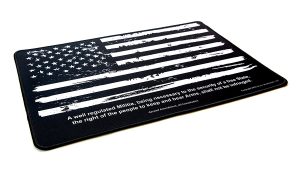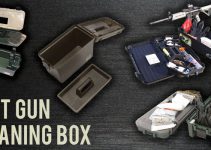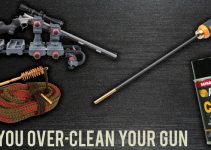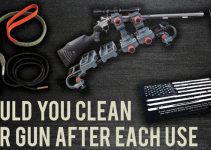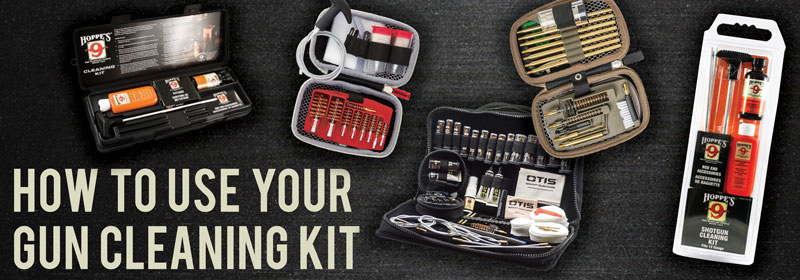 So you’ve decided that the cheap factory cleaning kit included with your firearm is not going to clean your firearm. Therefore, you’ve spent the money on a quality cleaning kit. That is easily the best investment you can make for your firearm, but knowing how to use your gun cleaning kit will ensure your firearm is cleaned and lubed properly.
So you’ve decided that the cheap factory cleaning kit included with your firearm is not going to clean your firearm. Therefore, you’ve spent the money on a quality cleaning kit. That is easily the best investment you can make for your firearm, but knowing how to use your gun cleaning kit will ensure your firearm is cleaned and lubed properly.
Every firearm has a unique process when it comes to cleaning it. Therefore don’t throw away any owners manuals, as these will help you know how to disassemble and properly clean and oil your firearm. If you happen to misplace your manual, YouTube has plenty of gun cleaning videos for almost every firearm. We will go over the essentials when it comes to using a universal gun cleaning kit for shotguns, handguns, and rifles. If you need some help with an AR, check out our AR cleaning tips here.
Top Related Article – Best Gun Cleaning Tools
When To Use Your Universal Gun Cleaning Kit –
New Firearm –
Buying a new firearm is like driving a new car off the lot… I hope no one believes me when I say that. If you’ve ever bought a new firearm and disassembled it, you’ll notice that manufactures excessively oil and lube their firearms. Ensuring that they don’t rust when sitting on the shelf.
Manufactures use lube that is designed for shelf life, not for shooting. The only gun maybe allowing you to shoot out of the box is a Glock. However, I found this out the hard way with a new Benelli shotgun. Forgetting to clean the gun out we shot 100 targets shooting sporting clays, and had multiple malfunctions. Ended up disassembling the firearm once done and realized how dirty the gun had become. All of the carbon and gunpowder had stuck inside the gun, ultimately gumming up with the manufactures lube. Therefore, whenever you buying a new firearm make sure to clean it properly before firing.
After Shooting –
After shooting your gun at the range or going hunting, it’s always recommended to clean your firearm. Sometimes you may not have enough time to do a full take down on your firearm. Therefore we will discuss some solutions to cleaning your firearm with a bore snake that can help save time. When you shoot your gun, carbon and gunpowder residue build up inside your firearm. Even when you only fire a few times and the chemicals and particles that attach to your gun can begin to harm it if not cleaned.
Before Storage –
If you are planning on storing your gun after hunting season or maybe don’t know the next time you’ll be at the range. It’s best to disassemble your firearm according to the manufacture and clean and lube metal parts that can oxidize and rust. The worst thing you can do for your firearm is shooting it and store it in your safe for months without cleaning it. You never know if there is moisture built in your gun that can begin to rust your firearm. A proper clean and lube are all it takes to maintain your expensive firearm investments.
How to Use Your Gun Cleaning Kit –
Work Place –
Be sure to create a clean and organized workspace when preparing to clean your gun. I usually use a workbench or folding table to create enough space for when I clean any of my firearms. It’s best to wash your hands with an anti-grease soap to wash off any oils that are on your skin that could damage your firearm. A gunsmith that I know even recommends using disposable gloves to prevent contaminating customers guns or more rather keeping his hands free of cleaning solvents. Gloves also make a really fast clean up since you can simply remove them and not have to wash your hands afterward.
Cleaning Mat –
If you have a cleaning mat, this is what I put on my workbench or folding table to help me clean my firearms. They are really affordable and prevent your work surface from any solvent overspray and they also help protect your firearm when setting it down. If you are looking for a cleaning mat, check out the best ones for each type of firearm.
Unload Your Gun –
By far the most important step before you learn how to use your gun cleaning kit is to double and triple check that your gun is unloaded. First, you want to unload any magazines and check the chamber to ensure that you physically know the gun is empty. You also want to visually inspect where a shell, or round would enter the bore to make sure that no shells are inside the chamber. You also want to ensure that no ammo is near or around where you are cleaning to maximize your safety.
Take Down Your Gun –
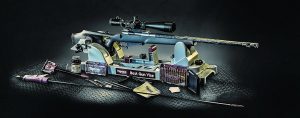 As I mentioned earlier, every manufacturer includes a takedown manual that has instructions when disassembling. Following the instructions will ensure that you remove parts with the proper tools and also remember to replace them in the correct sequence. Most manuals also give you instructions as to what needs to be cleaned and oiled routinely.
As I mentioned earlier, every manufacturer includes a takedown manual that has instructions when disassembling. Following the instructions will ensure that you remove parts with the proper tools and also remember to replace them in the correct sequence. Most manuals also give you instructions as to what needs to be cleaned and oiled routinely.
If you own a rifle, AR or even a shotgun a gun cleaning vise can come in handy. It allows you to clean the gun without having to hold it. Making it easier to clean out the bore and chamber. If you’re not sure where to find one check out the best gun vises.
CLP and Solvents –
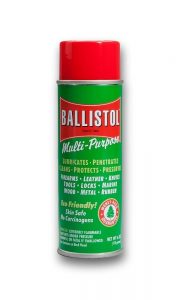 Cleaner, lubricant, and protection, better known as CLP, is the workhorse when it comes to cleaning your firearms. CLP is designed to be sprayed inside the firearms chamber, bore and bolt carriage helping break down any carbon and cleaning your gun parts. For most guns, you will want to spray CLP and solvents into the bore and let them sit for a few minutes to allow the chemicals to activate. You’ll also need to clean the firearm chamber and bolt carriage.
Cleaner, lubricant, and protection, better known as CLP, is the workhorse when it comes to cleaning your firearms. CLP is designed to be sprayed inside the firearms chamber, bore and bolt carriage helping break down any carbon and cleaning your gun parts. For most guns, you will want to spray CLP and solvents into the bore and let them sit for a few minutes to allow the chemicals to activate. You’ll also need to clean the firearm chamber and bolt carriage.
Gun Cleaning Rods –
After the CLP solvents have set for a few minutes you will take your gun cleaning rod. Most of the time these are included with any universal gun cleaning kit. Commonly made out of brass or soft metals. However some of the best cleaning rods are made of carbon fiber, you can check those out here.
By attaching a bore brush that is designed for the caliber size of the gun you are cleaning you will pull the cleaning rod and brush clearing the bore of any debris and gunpowder. Make sure you pull the rod through the same direction as a bullet would travel, so as to not damage the barrel.
Cleaning Bore Brush –
Bore brushes can be made of many different materials, bronze, copper, brass, and stainless. The main thing to consider is to select the correct size brush for the bore you are cleaning. By using too large of a caliber you can risk damaging the inside of the barrel. Also make a nice even pull with the cleaning rod and brush to prevent any damage.
Cleaning Patches –
Once the barrel has been scrubbed with a bore brush, use included nylon tips with a cotton cleaning patch to clean out the dirt and debris. You can spray a little CLP on each patch as you clean the barrel. The idea is to pass as many patches as it takes through the barrel until the patch comes out clean and white. This is how you will determine whether you’ve cleaned it properly.
Lubricants –
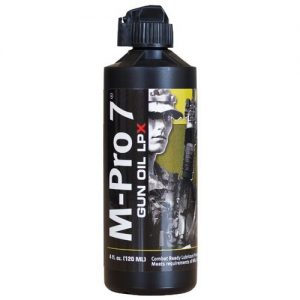 Once you’ve cleaned out all of the solvent and dirt, next you’ll need to use an oil or lubricant to protect the metal. You’ll also want to lubricate according to your owners manual. However, a great rule of thumb is to oil anywhere there is metal on metal. Especially any moving parts as well.
Once you’ve cleaned out all of the solvent and dirt, next you’ll need to use an oil or lubricant to protect the metal. You’ll also want to lubricate according to your owners manual. However, a great rule of thumb is to oil anywhere there is metal on metal. Especially any moving parts as well.
Exterior Cleaning –
Many universal cleaning kits include nylon brushes, you can even use a toothbrush with a little CLP to scrub any dirt or build up that has formed on the outside of your gun. Once you’ve cleaned that off a silicon whip from Hoppe’s works great for the exterior. It applies a thin layer of silicon to the outside, creates a protective layer from dust and preventing any damaging moisture or corrosive acids. I’ve yet to find anything that works better than these, plus they are extremely affordable. Check out the Hoppe’s Silicone Gun And Reel Cloth here.
Assembly –
Lastly, you will need to assemble your gun. Be sure to replace all of the parts according to your owners manual. Also be sure to not damage anything by forcing it to fit back together. Firearms are designed to be assembled with ease and not force.
Notes From The Field –
The steps listed above are designed for cleaning and using most universal cleaning kits. Every firearm is a little different and so are cleaning kits. When you make cleaning your gun a fun chore, you’ll learn exactly how to clean them and have a better appreciation for each firearm you own.
